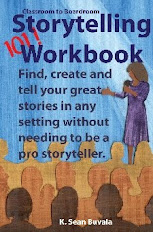Kathy Hansen, over at the "A Storied Career Blog" made an excellent posting about the ideas of expressing story via technology. She quotes from both the Sundance film projects and the new "The Center for Future Storytelling" at MIT. I think it is worth your time to go read her blog post at this link. It is actually worth your time to read her posts on a regular basis, in my opinion.
Top of my head, visceral thoughts about this interesting post:
They're both off the mark, in my opinion. Oral storytelling, person to persons, is still the "mother of all communication." What is referred to as storytelling in the above examples isn't storytelling. The first is filmmaking- which uses stories. The second is MIT's look at technology to convey stories. Again, not storytelling.
In no way do I disparage either the Sundance or MIT projects. I think both are needed and they do and will do good works. However, we do a disservice to what storytelling truly is when we toss about the word "storytelling" so freely.
I contend that all of the people on these projects need as their base some solid training and experiences in creating and speaking stories- oral storytelling ("traditional narrative?") as it were.
Storytelling (as person to person) was here as the foundation long before technologies sought to harness story.
As one of the first "traditional narrative" storytellers to embrace technology via Storyteller.net, I am for the use of technology to convey story. I am against the concept that technology is needed to rescue storytelling. "Traditional narrative...has been drowned out" is not my daily experience in teaching, training and performing.
What has happened is that we who practice the art have allowed our advocacy of "traditional narrative" to be drowned out. I've come to recognize this as the "hay wagon" syndrome: a rose-colored-glasses approach that says the 1970's days of the storytelling revival were the purest and most genuine when stories were told from the back of the hay wagon in Tennessee.
Some of that failure to advocate also comes from the nature of storytellers to not embrace technology to promote the art. Some failure also comes from infighting of leadership of the national organizations, especially in the U.S.
Finally, I think you ask a valid question about "losing meaning." More than losing meaning, I think stories when presented solely via technology are losing the engagement of the audience. Watching a story happen on film or otherwise delivered via technology requires zero engagement on the part of the viewer. The viewer becomes passive, with the story and its images poured into the head.
As an example: "The Dark Knight," the Batman movie, wanted to talk about the nature of evil. Since it was on film, there was no place for me to engage in that conversation. The movie showed it all to me, made my decisions about images, tried to tell me when to be scared and when to be happy. I loved the movie, but I didn't need to be there for the one-way story to happen. I know now the opinion of the director about a story but was not part of the storytelling.
In "traditional storytelling" I very much need my audience to co-create with me. You can see my short reflection article "Listening Sideways" for a little more about adolescents as co-creator of story. The link is http://storyteller.net/articles/206 .
Kathy, you do a great job making links and conversation points in your blog. Thanks very much.
The official blog for K. Sean Buvala, storyteller and storytelling coach.
Subscribe to:
Post Comments (Atom)





Thank you. I've given up (mostly) on my Google alerts for "storytelling" because I keep getting false leads.
ReplyDeleteRecently, I was excited to see a recommendation for a "Musical Storyteller for Birthday Parties" on my neighborhood listserv. I hoped that it was a recommendation for my services, as I'd been billing myself as a musical storyteller, or I was going to discover a new colleague in the area. It was neither. The recommendation was for someone who played her guitar and read aloud stories to kids. Reading aloud is great, but it's not storytelling. I was glad to be able to offer a free-to-the-public neighborhood musical storytelling program soon after.
Great comment. As far at the exactly what "storytelling" is, we are still in the eudcation phase. Sigh.
ReplyDelete